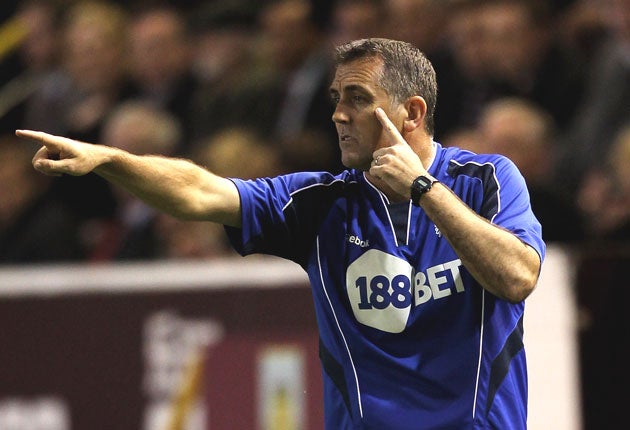Why Scottish bosses are in a league of their own

Your support helps us to tell the story
From reproductive rights to climate change to Big Tech, The Independent is on the ground when the story is developing. Whether it's investigating the financials of Elon Musk's pro-Trump PAC or producing our latest documentary, 'The A Word', which shines a light on the American women fighting for reproductive rights, we know how important it is to parse out the facts from the messaging.
At such a critical moment in US history, we need reporters on the ground. Your donation allows us to keep sending journalists to speak to both sides of the story.
The Independent is trusted by Americans across the entire political spectrum. And unlike many other quality news outlets, we choose not to lock Americans out of our reporting and analysis with paywalls. We believe quality journalism should be available to everyone, paid for by those who can afford it.
Your support makes all the difference.Owen Coyle, from the tough, inner-city Gorbals, against Davie Moyes, born and raised for the first 10 years of his life in an edgy northern area of the city called Thornwood. Two Glaswegians who share an upbringing exposed to hardship, an appreciation of working-class values, a natural command, a passion for football and its ability to transform lives, and a sense of purpose that is shaped by defiance as much as ambition. Bolton versus Everton brings them together today, but they are united in a different, more significant way.
They are among the six Glaswegians currently managing Premier League sides. How do we put this in context? Only five clubs are managed by Englishmen. Since 1986, three Scots – Sir Alex Ferguson, Kenny Dalglish and George Graham – have won the top flight 17 times between them, while only Howard Kendall, with Everton in 1987, and Howard Wilkinson, with Leeds in 1992, have triumphed in that time among Englishmen. The statistics come from The Management by Michael Grant and Rob Robertson, an insightful and diligent study of why Scots make such successful managers, and it is their hold on the Premier League that is revealing.
So why does Scotland, and Glasgow in particular, produce such revered figures as Ferguson, Matt Busby, Jock Stein and Bill Shankly? In part, it is their background, seeped in the grimy adversity of coal-mining and shipbuilding communities where proud men laboured tirelessly and came to rely on socialist principles and the shared responsibility of being part of a team; qualities they passed on to their sons with an implacable authority.
Football is ingrained in every corner of Glasgow (Istanbul is the only other city to house three football stadiums with capacities over 50,000, but has a population of 13 million compared to Glasgow's 600,000), and previous generations used to leave the shipyards at lunchtime on a Saturday and head straight to a game. Rangers and Celtic are not just major clubs, but social institutions around which different communities identify.
But other British cities are predominantly working class and in thrall to football, such as Liverpool, Manchester and Birmingham, while the coal fields of Yorkshire or the North-east were as challenging as those in the west of Scotland. Yet none have raised as many successful managers.
If a working-class background and an obsession with football can be shared, what separates the Scots? Each new generation follows an inspirational figure, with Ferguson having idolised and learned from Stein, and now Moyes, Coyle and Alex McLeish enjoying the same relationship with Ferguson. This heritage establishes a commitment to learning and thinking about the game, of not being afraid to be pioneering, idealistic even, and what it is to lead men.
Scots think about football in an unabashed, intense way. Five of the Premier League's Scottish managers began their coaching education long before their playing careers ended; the sixth, Dalglish, was intimate with the boot-room philosophy at Anfield.
This knowledge combines with the persecution complex that Scots carry over the border, so that they feel a need to assert themselves through triumph, while being dogged by a fear of letting their country down. This legacy – of history, inspiration and attitude – is why a new generation is already striking out for the summit of the English game. Three points are at stake for Coyle and Moyes today, but they are also driven by the achievements they must live up to.
Bolton Wanderers v Everton is on Sky Sports 1 from 3.30pm today
Scotland's great managers
1. Sir Alex Ferguson
Distinguishable from the rest because his Aberdeen team broke the Old Firm's dominance in 1980 before he travelled south to restore Manchester United to glory; and because his success is so enduring.
2. Sir Matt Busby
Built a thrillingly accomplished side, saw it destroyed in the Munich air crash, then built another acclaimed team. First established United as a major club, and his emphasis on home-grown talent and attacking football remains.
3. Jock Stein
First British manager to lift European Cup, with a team improbably drawn from within 30 miles of Celtic Park. A colossal and inspirational figure.
4. Bill Shankly
Took Liverpool from the old Second Division and raised them up to become an institution. A stirring communicator with a keen football brain, he made success an imperative at Anfield.
5. Willie Maley
Born in Newry, Northern Ireland but spent 87 of his 89 years in Scotland and considered himself Scottish. Managed Celtic from 1897 to 1940, winning 30 domestic trophies and turning Celtic into a prominent force.
6. Bill Struth
Also won 30 domestic trophies, including 18 League titles, managing Rangers from 1920 to 1954. He was such an influence on the Ibrox side that he is considered one of the club's greatest servants.
Richard Wilson
Join our commenting forum
Join thought-provoking conversations, follow other Independent readers and see their replies
Comments